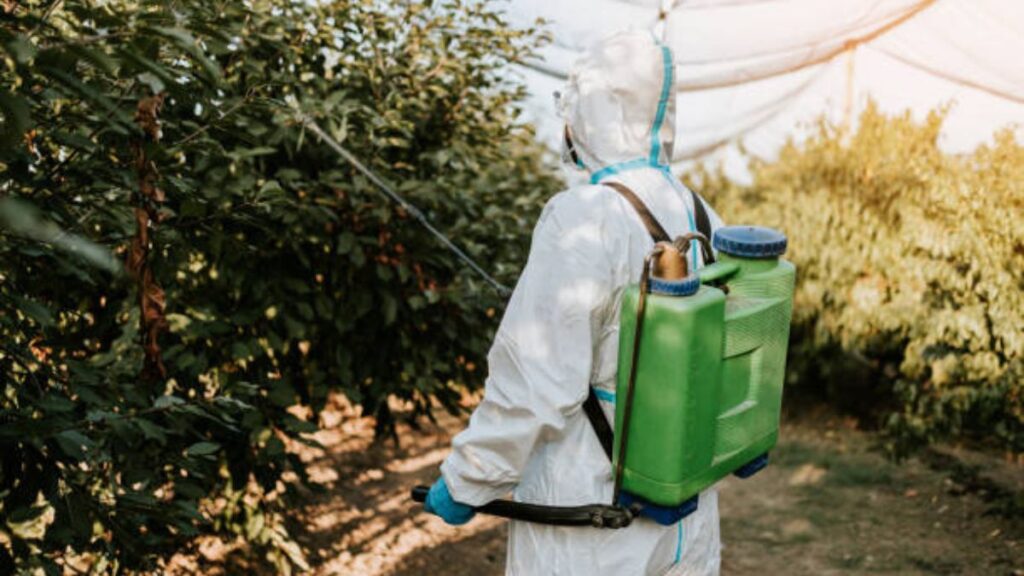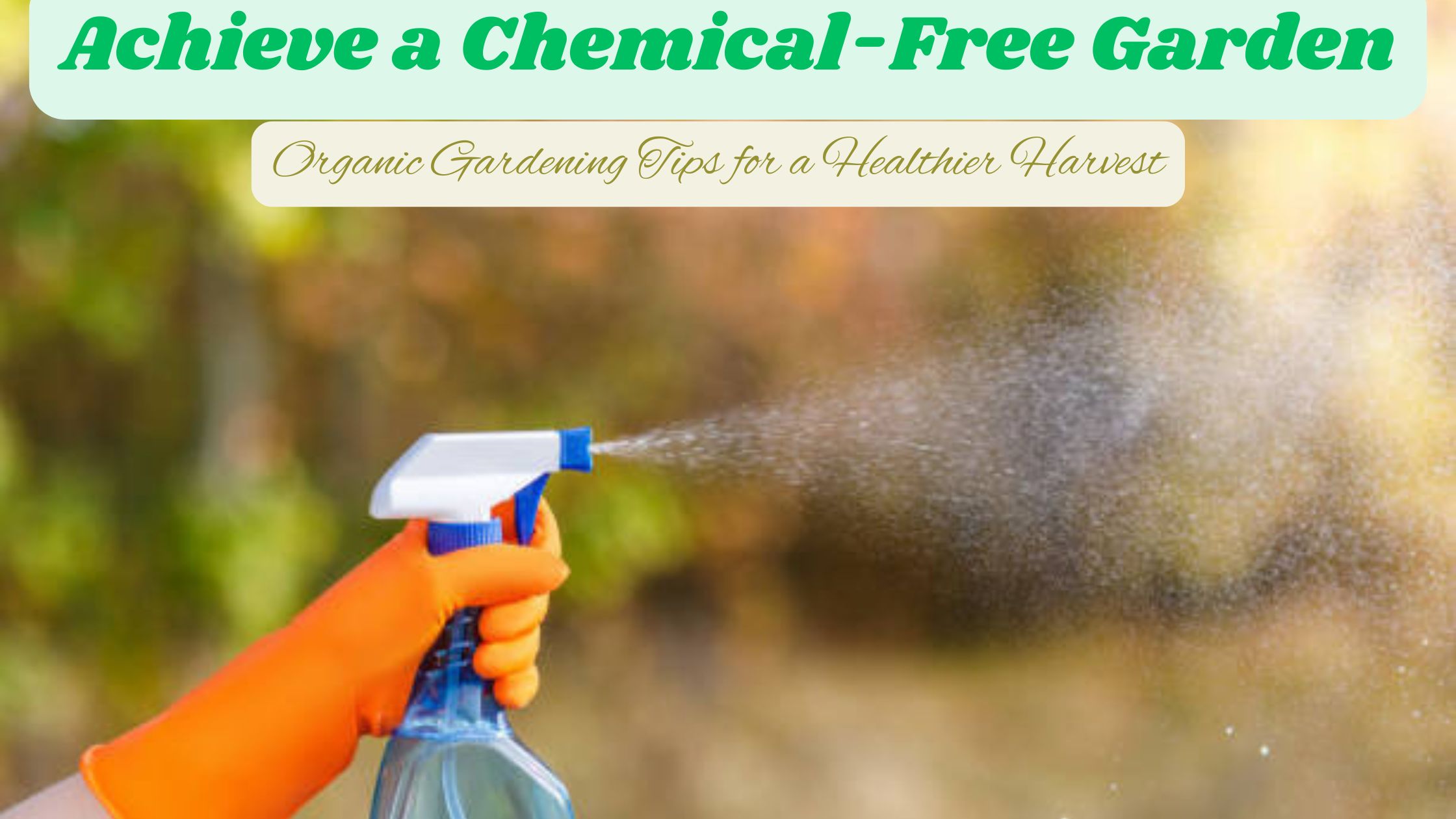Introduction
Achieve a Chemical-Free Garden: Organic Gardening Tips for a Healthier Harvest

Organic gardening transcends mere fads, offering a sustainable approach to cultivating flourishing gardens devoid of detrimental chemicals. It is attainable and profoundly fulfilling for both experienced gardeners and novices alike. This guide delves into pivotal organic gardening techniques that will empower you to nurture a healthier, more vibrant harvest..
Steps for maintain a Chemical-Free Garden
1. Lay the Foundation with Healthy Soil:
- Enrich your soil naturally with organic compost, improving its structure, and providing essential nutrients for your plants.
- Use organic mulch like straw, leaves, or grass clippings to retain moisture, suppress weeds, and add nutrients as it decomposes.
- Plant cover crops like clover or legumes during the off-season to prevent erosion, enhance soil fertility, and add organic matter.
2. Choose Certified Organic Seeds and Plants:
- Start with certified organic seeds or seedlings to maintain a chemical-free garden from the very beginning.
- These seeds and plants are free from synthetic pesticides and fertilizers, ensuring the integrity of your organic garden.
3. Practice Crop Rotation Strategically:
- Implement crop rotation to prevent soil depletion, reduce the risk of pest and disease build-up, and improve soil fertility.
- Rotate heavy feeders like tomatoes with nitrogen-fixing legumes to maintain soil health.
4. Employ Natural Pest Control Methods:
- Introduce beneficial insects like ladybugs, lacewings, and predatory beetles to manage pests without resorting to chemical pesticides.
- Use neem oil, a natural pesticide, to control various insects without harming beneficial organisms.
- Plant pest-repellent herbs like basil, marigold, or garlic alongside vulnerable crops to deter pests naturally through companion planting.
5. Opt for Organic Fertilizers Responsibly:
- Nourish your plants with organic fertilizers to promote healthy growth while preserving the environment and soil fertility.
- Brew compost tea to provide a nutrient-rich boost to your plants.
- Use fish emulsion for a quick nitrogen boost and incorporate bone meal into the soil for strong root development.
6. Practice Water Conservation Wisely:
- Install a drip irrigation system to deliver water directly to plant roots, reducing evaporation and water waste.
- Collect and store rainwater for garden use to minimize reliance on municipal water supplies.
- Water your garden early in the morning or late in the evening to maximize absorption and minimize evaporation.
7. Control Weeds Organically and Effectively:
- Regularly remove weeds by hand to prevent them from spreading and competing with your plants for nutrients, water, and sunlight.
- Apply a thick layer of organic mulch to suppress weed growth and improve soil health.
- Use corn gluten meal as a natural pre-emergent herbicide to inhibit weed seed germination.
What are the benefits of Chemical-Free Garden?
The Advantages of a Chemical-Free Garden:

- Wholesome Produce: Growing fruits, vegetables, and herbs sans synthetic pesticides and fertilizers yields chemical-free harvests. This results in healthier, more nutritious food for you and your loved ones.
- Environmental Stewardship: Chemical-free gardening practices safeguard the environment by minimizing pollution in the soil, water, and air. You contribute to preserving natural ecosystems, including beneficial insects, birds, and other wildlife, by avoiding toxic chemicals.
- Soil Vitality: A chemical-free approach focuses on building healthy soil through natural amendments like compost and organic matter. This creates richer, more fertile soil that can sustain plant life for the long haul.
- Flourishing Biodiversity: Without chemicals, your garden transforms into a haven for various organisms, from beneficial insects to microorganisms in the soil. This biodiversity creates a balanced ecosystem that naturally controls pests and diseases.
- Sustainable Practices: Chemical-free gardening is sustainable as it relies on natural processes and renewable resources. It reduces the need for external inputs, like synthetic fertilizers and pesticides, and supports long-term garden health.
- Cost-Effective Gardening: Eliminating pricey chemical fertilizers and pesticides saves you money on gardening supplies. Many organic practices, like composting, are cost-effective and use materials you already have.
- Superior Taste and Quality: Many gardeners find that produce grown without chemicals has a better taste and quality. The natural growth process allows fruits and vegetables to develop more flavor and texture.
- Safety for Families and Pets: A chemical-free garden is safer for children and pets, who might otherwise come into contact with harmful substances. This peace of mind is invaluable for families.
- Pollinator Sanctuary: Chemical-free gardens attract and support pollinators like bees, butterflies, and birds. These creatures are crucial for pollinating plants, including many food crops, ensuring a productive and healthy garden.
- Nature Connection: Gardening without chemicals fosters a deeper connection to nature. By working with natural processes, you gain a greater appreciation for the environment and your role in protecting it.
In summary, a chemical-free garden not only benefits your health and well-being but also contributes to a healthier planet, making it a rewarding choice for gardeners of all levels.
What is crop rotation, and why is it important in Chemical-Free Garden?
In a chemical-free garden, crop rotation is crucial for various reasons.

1. Soil Fertility Maintenance:
- Different crops have different nutrient requirements. Legumes like beans and peas add nitrogen to the soil, benefiting nitrogen-hungry crops like corn planted in the following season. Crop rotation naturally replenishes soil nutrients, reducing the need for synthetic fertilizers.
2. Pest and Disease Management:
- Pests and diseases often target specific crops. Planting the same crop in the same location annually allows these pests and diseases to build up in the soil. Crop rotation disrupts their life cycle by removing their preferred host, promoting a healthy garden without chemical pesticides.
3. Weed Control:
- Different crops compete differently with weeds. Rotating crops with varying growth habits disrupts weed growth, making it harder for them to establish themselves. Dense, fast-growing cover crops can outcompete weeds, reducing their presence in the garden.
4. Improved Soil Structure:
- Crops with different root structures impact the soil in various ways. Deep-rooted plants like carrots or parsnips break up compacted soil, improving aeration and drainage. Rotating crops with different root depths and types can maintain and enhance soil structure.
5. Biodiversity Promotion:
- Crop rotation encourages biodiversity by varying the types of plants grown in the garden. This diversity attracts beneficial insects and wildlife, contributing to a balanced ecosystem and helping control pests naturally.
6. Reduced Reliance on Chemical Inputs:
- In a chemical-free garden, crop rotation is key to managing soil health, pests, and diseases without synthetic inputs. It creates a resilient garden ecosystem that thrives without chemical fertilizers, pesticides, or herbicides.
Crop rotation is a fundamental practice in chemical-free gardening that supports soil health, pest and disease management, weed control, and overall garden sustainability. By strategically planning your garden’s crop rotation, you can enjoy bountiful harvests year after year while maintaining a healthy, chemical-free environment.
Conclusion
Unleash the potential of your garden by embracing organic gardening practices. Not only will you minimize the use of harmful chemicals, but you’ll also nurture a flourishing ecosystem that benefits the environment, your well-being, and the quality of your harvest. By following these organic gardening tips, you can cultivate a thriving garden that yields nutrient-dense, flavorful fruits and vegetables. Immerse yourself in the natural approach to gardening and reap the rewards of a healthier, more sustainable harvest.
References
- Rodale Institute. (2023). The Benefits of Organic Gardening. Retrieved from Rodale Institute
- Organic Consumers Association. (2022). Why Choose Organic Seeds? Retrieved from Organic Consumers
- Mother Earth News. (2023). Natural Pest Control: The Benefits of Beneficial Insects. Retrieved from Mother Earth News
- Soil Association. (2023). The Importance of Crop Rotation in Organic Farming. Retrieved from Soil Association
- Environmental Protection Agency. (2022). Water Conservation in the Garden. Retrieved from EPA
Invitation to Engage:
Are you excited to embark on your organic gardening adventure? Join our community by sharing your experiences and tips in the comments below. Don’t miss out on our eco-friendly gardening advice – subscribe now for more sustainable gardening wisdom!
